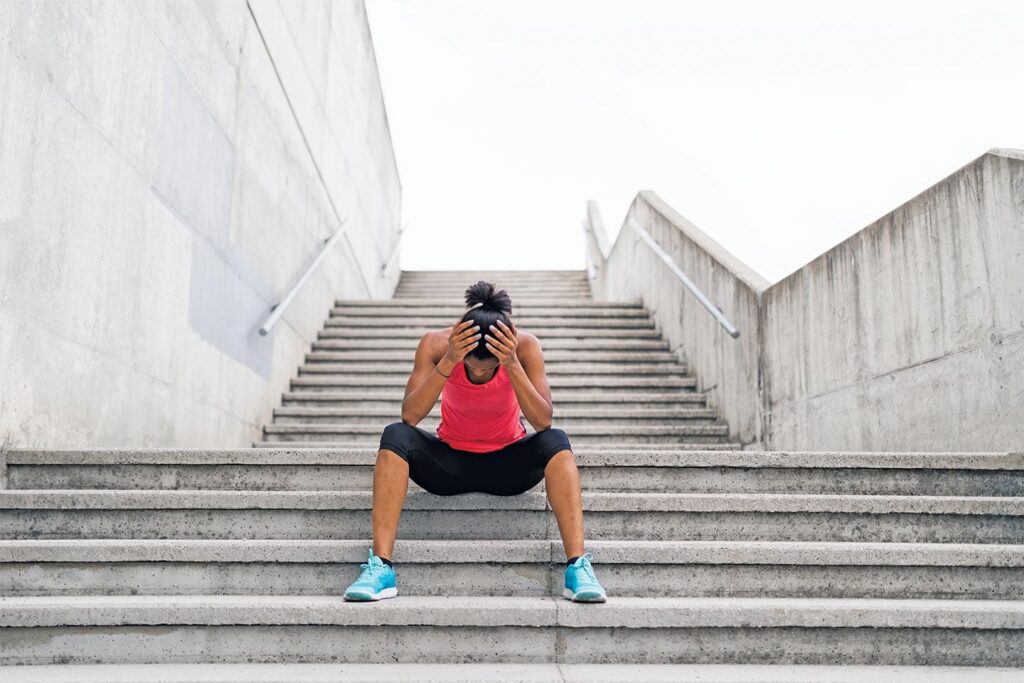Even Exercise Can Have Its Limits
The benefits of exercise are wide-ranging, extending to both your physical and mental health. Studies show that regular physical activity leads to improved mood and energy, better sleep, a healthier weight, and a lower risk of some diseases. Unfortunately, like many of life’s greatest joys – birthday cake included – too much of a good thing can actually do you harm. Here, licensed professional counselor Christy Call discusses what happens when exercise becomes too much of a good thing – and how to regain a healthy relationship with your workouts.
What Is Obsessive Exercise?
An obsession with exercise, often referred to as exercise addiction, is when the frequency and intensity of your workouts reach unhealthy levels. Call elaborates, “It’s when exercise goes from being a member of the cast to landing the lead role. When you plan your day, your time, and your life around exercise, something is off.”
Warning signs that your workout regimen borders on obsession include: ignoring your body and exercising when you’re injured or sick, exercising in secret, avoiding travel plans or social outings so as not to miss a workout, or missing a workout and experiencing inappropriate levels of guilt or other negative emotions because of that decision.


“Other signs to watch out for are limiting flexibility in your workout routine, isolating and working out alone as opposed to with a group, and a decrease in body image or self-esteem,” Call says.
How Can You Tell When Exercise Has Crossed the Line from Healthy to Unhealthy?
The difference between exercise and obsessive exercise can be difficult to discern. The most obvious indicators are physical consequences, such as exhaustion from too much time at the gym or chronic injuries due to lack of rest or proper healing. Your mental health can also suffer. Call shares, “There is research that supports the idea that overexercising – exercising that is out of balance – can lead to depression and even suicide.”
According to Call, listening to your body will help you determine when your exercise routine has crossed a line. “Our bodies talk to us, giving us all kinds of memos about how things are going – but you have to pay attention,” she says. “If you’ve twisted your ankle on the Stairmaster, then pain says, ‘Get off the Stairmaster!’ It doesn’t have to be forever, but certainly while your ankle is healing.”
What Are Steps You Can Take Toward A More Balanced Approach to Exercise?
Awareness is critical for change, as is acceptance. “All kinds of factors will play into how long this process of acceptance and change can take,” Call says. “At any step of the way, I suggest engaging in a mindful curiosity. Curiosity leads us to ask questions like, ‘What are the pros and cons of exercising this much? What is really important to me here?’ and ‘How can I achieve my goals in a way that is effective long-term?’”
Practically speaking, keeping a workout journal or incorporating mindfulness into your exercise routine can help you focus on how your body is feeling, ultimately encouraging a more intuitive approach to exercise. Switching up your workout routine to include yoga, walking, or swimming can give your body the rest it needs. “I think it’s also beneficial to redefine exercise to include housework, yard work, playing with the kids – all of these activities can be ways to address your body’s need for movement while honoring its limits,” Call adds.
If finding a balance proves overwhelming, seeking the advice of a professional can help. “Examining how exercise is affecting your quality of life at home, at work, and with friends can help you determine if professional help is warranted,” Call says. “And certainly, if you have lost a substantial amount of weight in a short period of time or are experiencing health issues related to your exercise, please seek professional help.”



Christy Call, LPC-MHSP, LMFT
Licensed Professional Counselor & Licensed Marriage and Family Therapist

